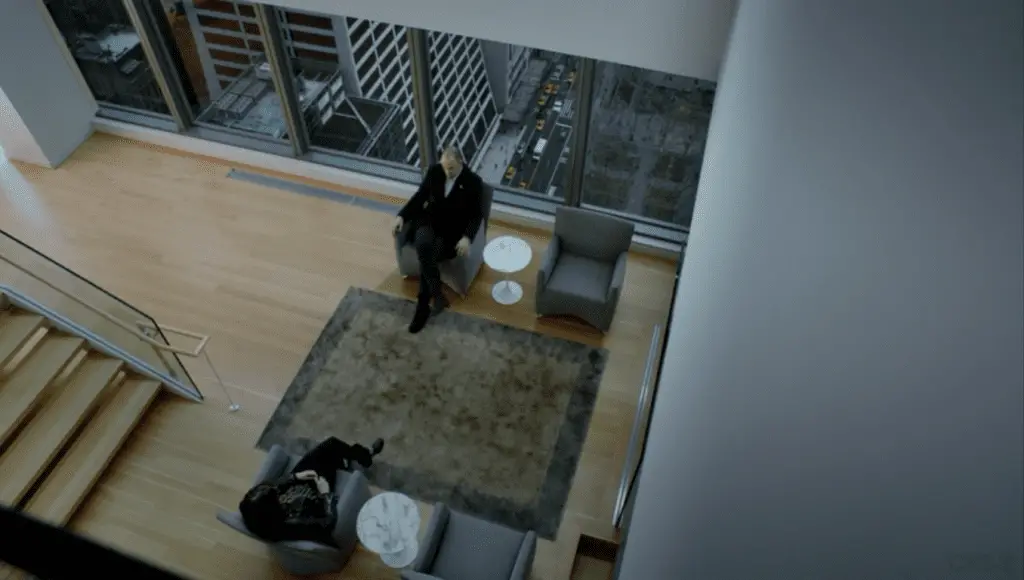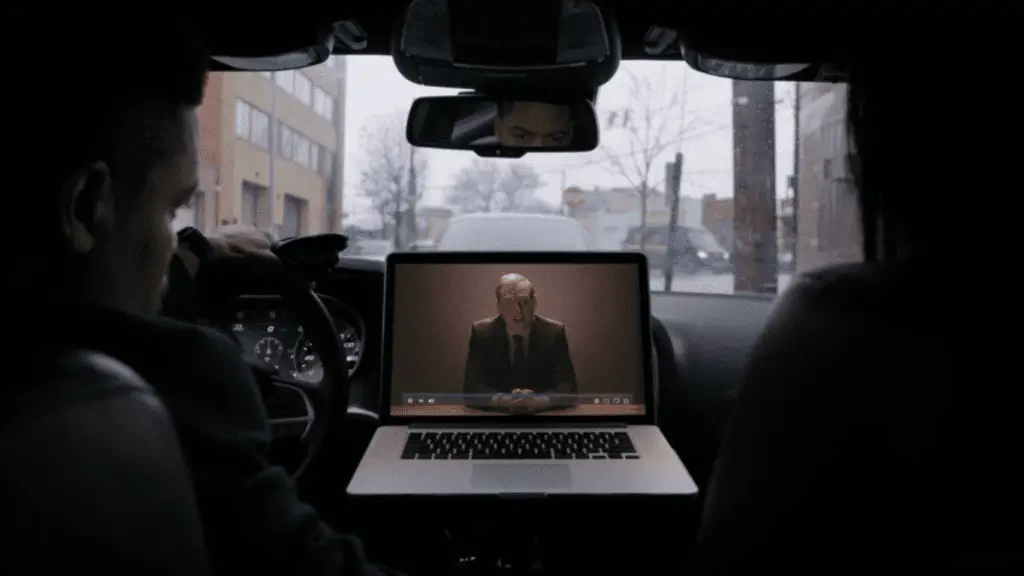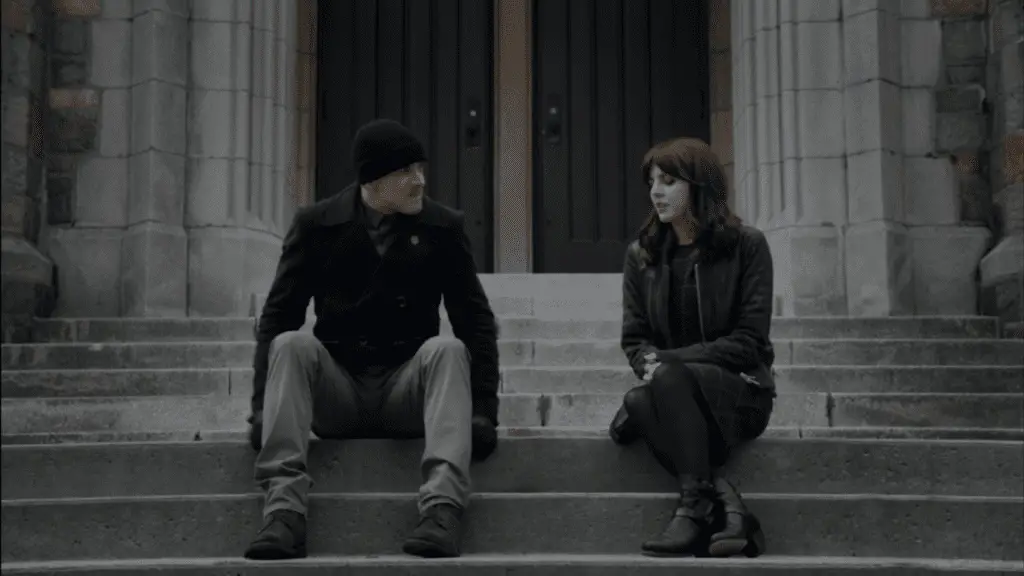After Sherlock was dramatically arrested in last week’s twist ending, we find our hero in an ominous interrogation room. The mysterious red-haired villain, who has the appropriately evil sounding name of Anson Gephardt, shows up with the usual spiel of threats to warn Sherlock off investigating the deaths relating to the Kotite case. In a shocking twist, as soon as Sherlock is set free, he decides to – wait for it – continue investigating the case. Strap in, kids, because this week’s plot is positively labyrinthine.
A bit of investigation reveals that Gephardt is a member of a American intelligence agency with a grudge against the Iranian government. Going over the files from Kotite’s hit and run case reveals nothing of interest, so Sherlock theorizes instead that something happened in the area that would have made the jury members of interest to Gephardt. Perhaps they saw or overheard something in the court case that needs to be covered up. In order to find out more, Joan heads off to speak to the widow of Cy Durning, the prosecutor of Kotite’s case, while Kitty and Sherlock go to speak to Farrell and Putnam, the law firm that Kotite’s defense attorney, Tom Saunders, worked for.
Sherlock and Kitty sit in awkward silence at the firm until Sherlock, god bless him, tells Kitty that her son was beautiful and that he’s happy for her. I’m so proud of him. Kitty accurately points out that Sherlock doesn’t exactly sound happy about it. Before they can discuss further, it’s time for them to talk to Sydney Garber, the managing partner of F&P. He refuses to give them access to the case files they request, but he does reveal one intriguing piece of information: Saunders had paranoid schizophrenia. Meanwhile, Cy Durning’s widow is more helpful. Durning was secretly recording all of his cases on cassette tape, including the Kotite case.

The team’s new discoveries come together when Joan finds a section of the tape in which Saunders breaks into a diatribe clearly influenced by paranoid delusions. He made several extreme claims about astronauts, a Venezuelan bomb, and buried gold. Joan believes one of Saunders’s delusions must have been actually true, and that everyone in the courtroom at the time was killed for hearing it.
Not only does Sherlock find this claim plausible, but he knows immediately which claim is true. A few days earlier, shortly before Kotite’s murder, a bomb was set off in a library restroom in Venezuela, killing dozens of people and nearly killing the president. The president then went on to win his re-election bid due to the sympathy vote earned by his apparent near assassination. Sherlock concludes that Gephardt, a rogue agent, orchestrated the bombing in order to help the Venezuelan president win. The connection to Saunders must be that his law firm, Farrell and Putnam, has locations around the world, including Venezuela. Sherlock thinks that Gephardt must have used the law firm to get in contact with a Venezuelan corporation that helped him with the bombing. The question now is why, and who. Sherlock and Joan break into F&P’s offices to go through their files to try to find answers, and find an unexpected one.
A note on a file proves that Sydney Garber also knew about the Venezuelan bombing well before it happened. Gephardt wasn’t using the law firm to get in contact with Venezuelan companies; he was working with Garber and Saunders, and that’s how Saunders knew in advance about the bombing.
Joan and Kitty head back to the law firm to speak to Garber again. But before they can get anything out of him, a man on a motorcycle appears and attempts to gun them all down. Joan and Kitty narrowly save Garber’s life, through the heroic measure of Kitty kicking him in the groin to force him to dive to the ground.

Realizing that Gephardt has turned on him, Garber willingly talks, spinning them a tale of international intrigue spanning decades. Back in his university days, Garber was roommates with a man who went on to become the head of Venezuelan intelligence. Three years ago, Gephardt asked Garber to put him in contact with this man. Gephardt arranged a deal in which he would fake an assassination attempt on the president so he could be re-elected in exchange for something called the Fidel Files. The files are supposedly a collection of all the information that Fidel Castro shared with his communist allies over roughly fifty years. (Did you notice the episode title is “Fidelity”? Har har.) In order to prove his story, Garber hands over his own copy of the files.
Here’s where things get even weirder, and start to not quite make sense. Naturally, Detective Family assumes that this file must have been Gephardt’s ultimate goal all along. They dive into the files, trying to find just what it was that Gephardt was looking for. But before they can get very far, Gephardt uploads to the internet a video of himself confessing to his crimes. He also uploads a copy of the Fidel Files, but with one key difference; in his version of the files, there’s a film clip that seems to prove that the Iranian government has nuclear weapons. The team realizes that planting this clip must have been his goal all along.
So, quick summary, because I’m having a hard time following this myself: Gephardt, who considers the Iranian government a threat to U.S. safety, decided to engineer a video that would motivate the US to go to war with Iran. But he knew that if he simply put this video on the internet, people would be rightfully suspicious of its authenticity. He needed a context that would make the video seem believable. Thus, the Fidel Files. Because everything else in the Fidel Files is true, it would make Gephardt’s fake video clip seem believable too. But to get the files, he had to kill people in Venezuela. In order to cover that up, he murdered the handful of people that knew about the bombing in advance. Then, immediately after covering up his crimes, he…confesses to his crimes. Wait, what?
I follow everything else about this story. It’s a little over the top in how elaborate it is, but I can follow the chain of events. What I don’t understand is why Gephardt would go to such extreme ends to cover up a crime that he planned on confessing to the entire time. There was most likely only a slim chance that Kotite and the others would realize that a rant they heard three years ago from a delusional man was related to a current crime. And even if they did figure it out, Gephardt planned to confess anyway, so the truth would come out regardless.
Murdering those people was not only pointless, but made things more difficult for Gephardt. It drew the attention of Kitty, Sherlock, and law enforcement and triggered their investigation into him. If the police had arrested Gephardt before he received the Fidel Files or was able to post them, his plot would have failed. Why would a man as careful as Gephardt take an unnecessary risk like that? It simply doesn’t make sense. And considering Kotite and Durning’s murders was what kicked off this entire story, that’s disappointing.

But anyway. The stress of trying to keep up with Gephardt at last prods Kitty into confronting Sherlock about his behavior to her. She angrily criticizes him for how cold he’s been to her since she told him about her baby, and accuses him of being angry with her because she’s quitting detective work. If being a detective is requisite to being Sherlock’s friend, then they’re over.
Sherlock counters that he isn’t angry with her for quitting; he’s angry because when she fled the country two years ago, she never contacted him again, not to let her know that she was okay…and not to let her know that she had a baby. He’s happy that she’s happy, but he had thought their friendship meant more than that.
I have to say, I felt pretty vindicated by this part, as I was also frustrated by the fact that Kitty just completely vanished after she left, with barely any mention of her ever again. But I have a ton of thoughts about how Kitty and Sherlock’s relationship was represented in this episode, so I’m going to save it for the end so as to not clutter things up.
Sherlock thinks that the only way to ease the nation’s rising paranoia about the supposed proof of Iranian nuclear weapons is to get Gephardt to confess to faking the video. But before he can get to Gephardt himself, governmental forces find and take him down. Sherlock’s chances seem lost, until Sherlock realizes that Gephardt’s home has all the proof he needs that the video was faked. He assembles his proof and passes it on to various governmental sources. And that, rather underwhelmingly, is how the Gephardt plot is wrapped up. It’s just…suddenly over.
The episode itself wraps up with Kitty asking Sherlock to come meet her in front of a church. She explains to him that when she returned to London, she expected to have a hard time alone and to need to dive in her work, only to discover that she felt fine and happy. The word she uses is “fixed.” She realized she didn’t need detective work anymore, and had been thinking of quitting even before her pregnancy. But knowing that Sherlock did not feel “fixed,” she didn’t feel comfortable contacting him and just kept putting it off. She admits that if it wasn’t for the Kotite case, she might have never contacted him again. But she knows he deserves better than that, and she promises to not do that again. To cement her promise, she invites Sherlock and Joan to Archie’s christening as his godfather, and promises that from now they are family.
This was a feel good ending, and it was definitely cute to see how surprised and happy Sherlock was, but overall, I don’t feel good about this ending or this episode.

First of all, the whole thing felt really rushed. I suspect that the writers had Kitty’s actor, Ophelia Lovibond (what a great name), available for only a few episodes and wanted to give her a satisfactory goodbye in this limited space. That’s an admirable goal, particularly because I was dissatisfied with how she was written off before, but I just don’t think two episodes was ever going to be enough. I mean, as I’m sure I’ve made clear, I love Kitty Winter, so I was probably never going to be totally happy anyway. But I just don’t think they could ever wrap up the complex feelings that Kitty and Sherlock’s relationship encoded in just two episodes. How do you explain why Kitty vanished for two years, prove that she’s happy now, give a believable reason for why she won’t be back permanently, deal with how Sherlock would feel about that, and provide an emotional conclusion to a powerful friendship, in just two episodes?
And they didn’t help themselves by coming up with such an over the top murder/conspiracy plot to go with it. Again, I think they were being ambitious with this plot, and ambition is to be applauded. But maybe it wasn’t such a great idea to put the super complicated plot in the same episodes as the super complicated friendship. Both stories ended up being rushed and full of holes, which is the inevitable result of trying to shove so much into less than two hours of television.
As well as being rushed, I’m also pretty uncomfortable with the way that Kitty and Sherlock’s relationship was treated. For me, Sherlock and Kitty’s relationship has always been highly symbolic. In season one and two, Sherlock still essentially considers himself as a one man island who does not need or want connections with other people. His partnership with Joan begins to break down this perception of himself, but to me, it was his friendship with Kitty that really proved to him that a) he is capable of connecting with people, and b) these connections actually are something he wants. Kitty is the person that proved Sherlock was capable of loving more people than Moriarty and Joan. That’s a big deal. How can a five minute conversation at the end of an episode possibly encapsulate all of that emotion? And to suggest that it can is a disservice to the significance of their relationship, even if you do say some sappy stuff about how their really family.
Even worse, I was really uncomfortable with the simplistic way that they talked about Kitty’s mental state. “Recovery” is such a complex idea. It’s an admirable goal, and there’s nothing wrong with striving to attain it. At the same time, it’s not possible for everyone, and that’s okay too. Elementary usually takes the stance that Sherlock probably will not ever attain a point of “recovery.” He will always be a recovering drug addict, and he’ll probably always be depressed. Normally, I really appreciate that. The idea that “recovery” is the be all end all goal of mental illness is a concept that can be used to harm mentally ill people and even suggest that their lives aren’t meaningful or worthwhile unless they can attain that. Seeing a flawed but ultimately admirable individual like Sherlock simply live with his mental illness is a wonderful thing.
They didn’t give Kitty the same kind of complexity when it came to this big question. Was that really an accurate representation of how recovery from trauma works? From Kitty’s description, she was just okay one day. Does that really happen? I felt that in order to reassure the watcher that Kitty was leaving the show happy, they just erased her emotional struggles and told you she’s all better now, and that rubs me wrong.
Even if the portrayal of her recovery is accurate, the language that they used was so simplistic that it made me really uncomfortable. Let me say again that they literally used the word “fixed.” “Recovery” is one thing. “Fixed” is something else, particularly since the opposite of fixed is “broken.” People who don’t or can’t obtain a state in which they feel they are now okay or recovered are not broken and it is hurtful to suggest otherwise.
To be fair, Sherlock does conceive of himself as being broken. He has said as much. And I know that many mentally ill people (including me!) feel that way at times. But it’s one thing to feel that way about yourself, and another thing for someone else – for one of your closest friends! – to indicate that she thinks of you as being broken too. I know that Kitty and the writers meant well, but I felt like the potential to interpret her words in a hurtful way is too high. And even if you didn’t take it that way, it’s still a really shallow explanation of Kitty’s behavior. It’s an injustice to Kitty and to trauma survivors, and it’s disappointing to see in a show that usually tries to portray mental illness in a nuanced way.
Overall, my conclusion to this episode is something I have heard said on many a cooking competition show: the ideas were good, but the execution needed work. The conspiracy was a cool idea but it was too complicated and rushed, and that lead to plot holes. A proper farewell to Kitty is a lovely thought, but in order to wrap up a highly complex relationship and character in one episode, they ended up simplifying Kitty and Sherlock’s feelings in a disappointing way.

